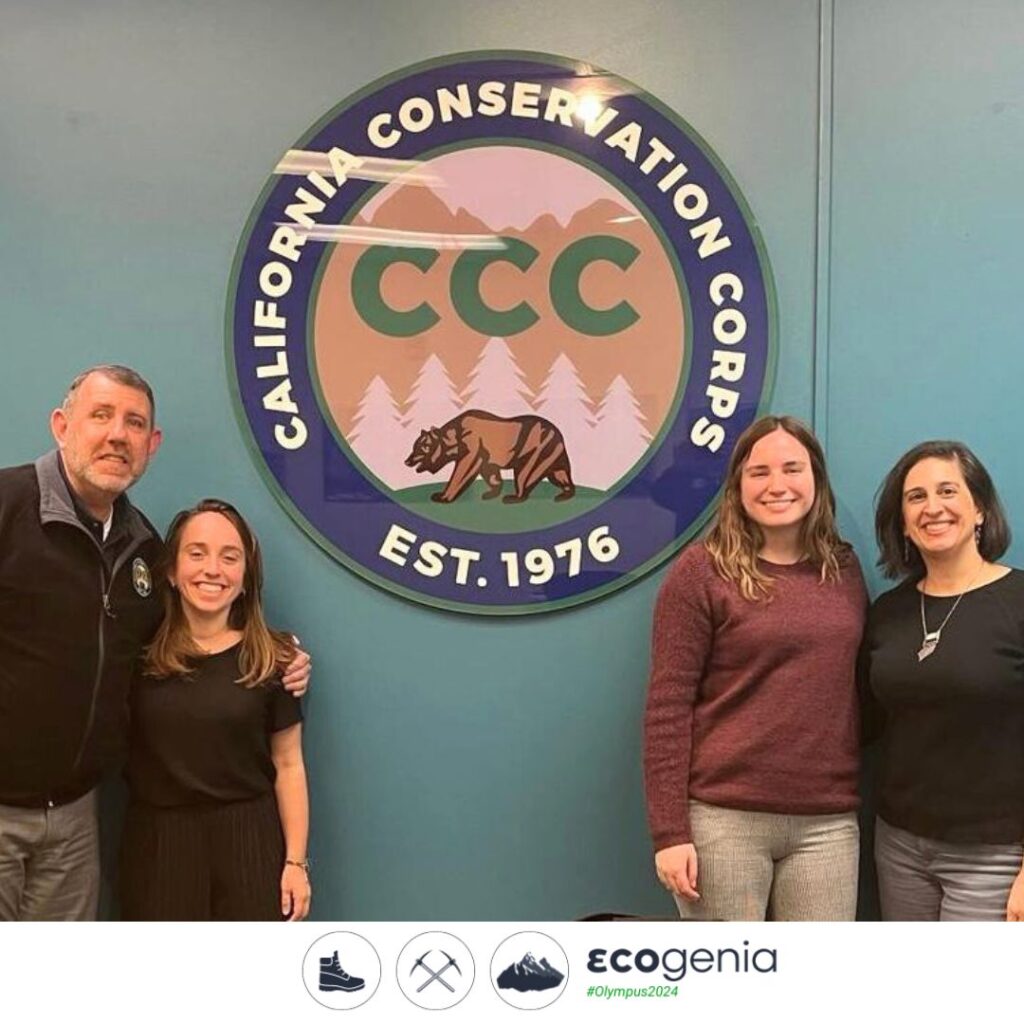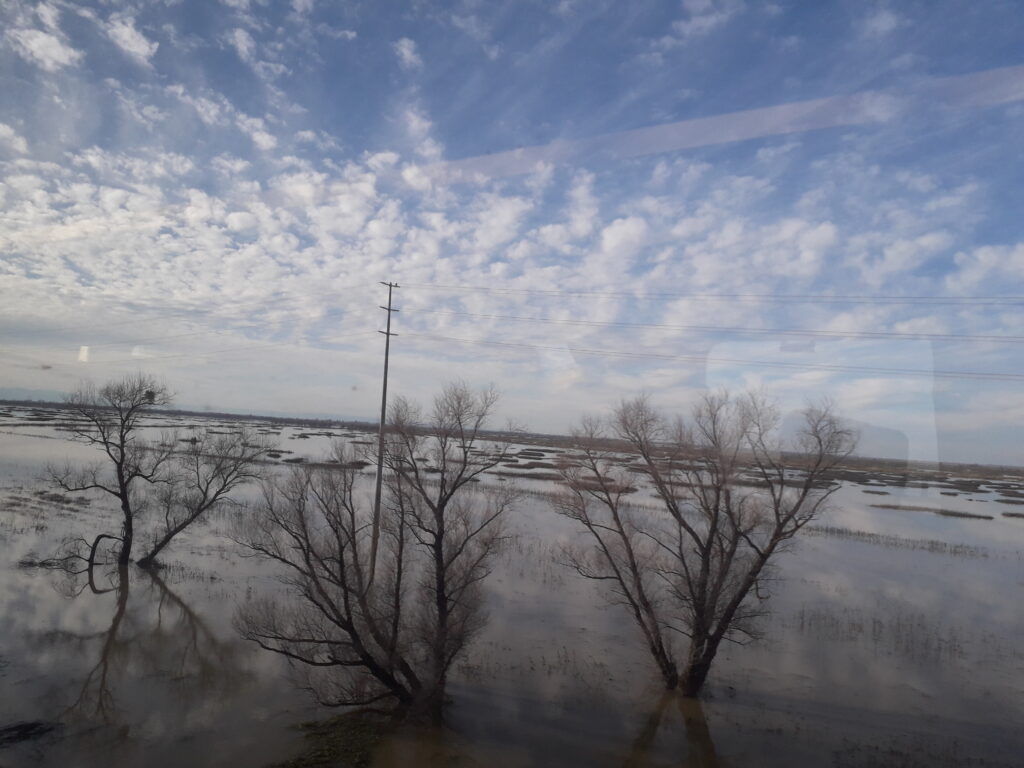
Aphrodite Bouikidis
Urban resilience expert and facilitator of Ecogenia's expert focus group on Disaster Risk Management, shares a summary of her engagement with the California Conservation Corps (CCC) in the lead up to the capacity-building exchange between the CCC and Ecogenia in Mt. Olympus in Spring 2024.
In February, I traveled from my home in Vancouver, British Columbia, Canada south to California to get to know the California Conservation Corps.
I recently joined Ecogenia to coordinate an advisory focus group on youth civic service in disaster management. Through Ecogenia, I heard and read a lot about the California Conservation Corps, known also as the CCC or “The C’s”, because it is an inspiration, model and advisor for Ecogenia’s work in developing a youth climate corps in Greece.
The Ecogenia team traveled to California last year for a week-long training with the CCC that included workshops with senior leadership and visits across California to see corps members working on a range of projects. Ecogenia Co-Founder Lia Papazoglou wrote about this training here, and advisor Anastasis Stamatis wrote about the experience here.
And now, in a few months, CCC youth corps members and some of the leadership team will join Ecogenia in Greece.
My trip to San Francisco was an opportunity to join Ecogenia development manager Melina Dunham in a visit to the nearby capital city Sacramento to spend a little time with CCC leadership at their headquarters and learn more about the how and why of their work.
A train ride through beautiful California wetlands
I am fortunate to be in San Francisco during sunny days, because during the previous week, California experienced an atmospheric river that brought flash floods and hurricane-force winds in the San Francisco area. More rain is expected for the following week.
On the less than two-hour train ride from San Francisco to Sacramento, I put away my phone and look out the window. The train rolls past some industrial areas along the San Francisco Bay, past an oil refinery, a sugar refinery. But then it crosses a bridge and our view is a beautiful wetland area on either side, with various birds swimming, flying or standing in the water waiting to catch a meal.
First thought: what is this lovely place? Check location on phone map. Second thought: snap and send a photo to my partner and my friends that want to know how my journey is going. Third thought: this must be a managed water ecosystem that serves a flood protection purpose.
I enjoy the view and make a note to do some research about this area later.
We arrive at the Sacramento station where Larry Notheis and Teagan Felknor-Edwards pick us up and take us to a Mexican restaurant for lunch. Larry is the Senior Deputy Director and Teagan is an Executive Analyst with the CCC. We order, Larry asks if we enjoyed the train ride, Melina and I comment on the beautiful views. Larry immediately informs us that we passed through the managed delta that helps control the seasonal floods and excess water of the Sacramento River that flows through Sacramento, and rice is also grown here, scheduled in a way that benefits wildlife. This is the Suisun Marsh, a brackish tidal marsh where freshwater from the Sacramento and San Joaquin rivers meet the saltwater of the San Francisco Bay.

I love how I did not even have to ask whether the wetland ecosystem had a flood mitigation purpose. We all just think about these things as we observe the ecosystems around us.

Conservation…and more! Lessons for Greece
The CCC is the largest and oldest conservation corps in the U.S. While it features conservation in its title, it is really a conservation and disaster management corps. It provides young adults an opportunity to join for up to a year of paid civic service, working on projects for environmental conservation and prevention or response activities related to wildfires, floods and other disasters.
We spent about three hours speaking with Larry and Teagan, meeting some of the other deputy directors, and taking a brief tour of the office space and the photos of historic CCC milestones featured on the walls. Even in this short time, I came away with four insights about the experience and impact of the C’s that I believe are important for an audience in Greece.
- The CCC benefits youth with employability and civic consciousness because it provides pay and training, an opportunity to experience and connect with nature and bond with a team, and a chance to do work that benefits communities and our natural environment. Many of the corpsmembers also do volunteer work of their own initiative while they are doing their paid civic service work. This was the case with the young people that participated in Ecogenia’s pilot projects as well! But it is important to note that paid civic service is provides a more equitable opportunity for youth, because not everyone can afford to commit weeks or months for volunteer work.
- Young adults are not afraid of hard work or even miserable conditions if they know they are contributing to important civic projects and gaining a path to a career with impact. The CCC motto is ‘Hard Work, Low Pay, Miserable Conditions and More!” The website proudly promises to “transform your life” if you join. The motto seems to work: approximately 3,000 Corpsmembers enroll each year, from all over California and from diverse backgrounds. Most of the senior leadership team started out as corpsmembers, and they mention this with pride and appreciation for that early experience.
- This youth civic service model helps strengthen the professions that our societies need as they face more frequent and intense climate and weather related disasters. Professionals working in climate adaptation and disaster risk management are needed with increasing urgency, and this will continue to be the case for a long time. The CCC creates a talent pipeline by enabling youth to develop the skills, experience and awareness they need to be qualified to join these careers.
- The government and political leaders of California recognize and support the value of the CCC and youth civic service in conservation and disaster management. The Corps is part of the California state government, as a department within the California Natural Resoures Agency. State governors of both major political parties in the U.S. support the CCC, and it has been incorporated into California’s State Emergency Response Plan and responded to all major disasters in California in the past three years.
Greece is experiencing devastating disasters more and more frequently. These disasters are triggered by climate and natural hazards, including longer heat waves and drought, and more intense extreme rain events. But the disasters really occur because communities are exposed to the hazards of wildfires and floods and Greece spends few resources on mitigation, disaster management and climate adaptation. This has to change rapidly. Youth civic service is one effective, relatively low cost, and multi-benefit approach to disaster risk management that Greece needs.
